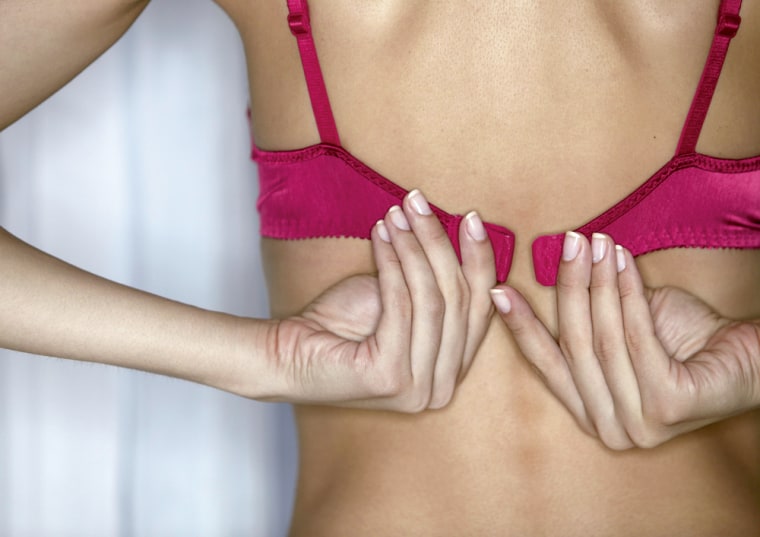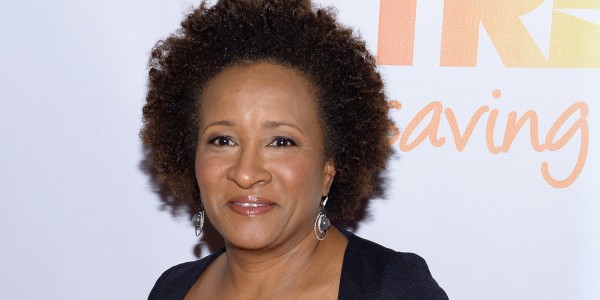TODAY is presenting the series "PinkPower" for National Breast Cancer Awareness Month — celebrating the survivors, supporting and remembering loved ones we've lost.
Despite expert effort to set the record straight about breast cancer, myths persist.
“There is a lot of breast cancer awareness among people, but not necessarily a lot of knowledge about the disease,” says radiation oncologist Dr. Marisa Weiss, founder of the website breastcancer.org. It can be dangerous to a woman's health when she chooses to believe a myth rather than evidence-based findings about the disease, says Cleveland Clinic breast surgeon Dr. Stephanie Valente.
These are five of the most common breast cancer myths — dispelled. Hopefully, once and for all.
Using Deodorant Causes Breast Cancer
Deodorant and antiperspirants don’t cause breast cancer. Period.
Yet doctors hear it all the time, says Dr. Ruta Rao, associate professor of medical oncology at Rush University Medical Center in Chicago. It may have started more than a decade ago with email blasts warning women of some type of connection, including the assertion that specific chemicals found in these products mimic estrogen, upping a woman’s breast cancer risk.
“It’s simply not true, and there is no evidence to support that myth that antiperspirants and deodorants cause (breast) cancer or breast cancer recurrence,” says Rao. “Women don’t need to be fearful of this.”
Wearing an Underwire Bra —or Any Bra —Causes Cancer

There is no evidence to support the bra myth, says the Cleveland Clinic’s Valente.
In fact, a new population-based case-control study published in the journal Cancer Epidemiology, Biomarkers & Prevention found no association between wearing a bra and an increased breast cancer risk among post-menopausal women.
The researchers also found it didn’t matter how many hours each day a woman wore a bra, whether it was an underwire bra, or at what age a woman starting wearing a bra.
If I Have Cancer in One Breast, A Double Mastectomy Will Save My Life
This one persists, as more women opt for double mastectomies — despite research showing it doesn’t improve survival rates.
A new study in the Journal of the American Medical Association shows about 12 percent of women with breast cancer chose to undergo a double mastectomy in 2011, up from 2 percent in 1998. More than 30 percent of women patients under the age of 40 chose the procedure. The survival rate of a double mastectomy over 10 years was 81 percent in the 200,000 women who were part of the study, compared to 83 percent for patients who chose lumpectomy, a breast-sparing procedure, followed with radiation.
“There’s been a dramatic increase in the number of women who want both breasts removed, despite good research showing that survival isn’t improved,” says surgical oncologist Dr. Jill Dietz of University Hospitals Seidman Cancer Center in Cleveland, Ohio. “It is very hard to convince women otherwise.”
The actual risk of developing cancer in an opposite breast is very low: about 1 percent or less, she says. Plus, a double mastectomy is also a longer and more aggressive surgery and carries greater risk than breast-sparing procedures.
Exposing Cancer to Air Will Cause it to Spread
“I still hear this all the time, and I have to admit it drives me a little crazy, but I do understand the fear that women have about surgery,” says Dietz.
The myth of air causing cancer spread could be related to doctors discovering that the cancer is more advanced than initially thought, requiring a more aggressive procedure. But "there is absolutely no evidence to support this myth," she says.
I Can’t Do Anything To Reduce My Risk
There are certain things you can’t change. As you age, your risk of developing breast cancer goes up. You can’t change your genes either, and some genetic profiles put women at greater risk of developing breast cancer.
But to say you can’t do anything is completely untrue, says Dr. Otis Brawley, chief medical officer of the American Cancer Society.
What you can do:
- Try to lose some weight. “The obesity problem in the U.S. is fueling the breast cancer problem,” he says. For post-menopausal women, the major source of estrogen is found in fatty tissue, and part of an increased risk for breast cancer among this group may be due to excess estrogen being made in these fatty tissues. “There is significant evidence that losing weight lowers breast cancer risk, and getting to a normal weight does good things for the other body systems,” he says.
- Regular exercise helps, too, and you don’t have to run a marathon to reap some benefits. Brisk walking of 75 to 150 minutes may be enough. But having a more aggressive exercise routine can lower your risk even more, according to the American Cancer Society.
- Limiting alcohol intake is a good idea, too. Evidence shows that women who drink two or more alcoholic drinks per day have about one-and-one-half times the risk of breast cancer compared to teetotalers.
Will Myths Persist?
“I think as long as there is fear, there are always going to be myths,” says Brawley, citing the fact that some people still believe the radiation exposure of mammograms causes breast cancer (not true), that only women get breast cancer (men can develop the disease, too), and that if none of your close relatives had breast cancer, you won’t get it either.
About 85 percent of breast cancers are found in women with no family history of the disease. “We absolutely need to do a better job educating people, and we absolutely need to keep doing research to find more answers about this disease,” Brawley says.
“With more answers there will be fewer myths.”
Joan Lunden: 10 things I wish I knew before I was diagnosed with breast cancer
TODAY is all about #PinkPower this week…Send us your pics on Twitter, Facebook and Instagram with PinkPower.
